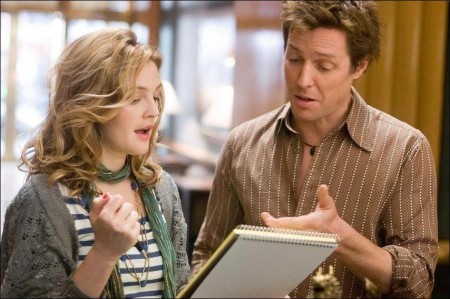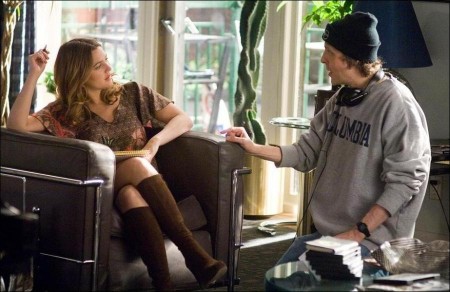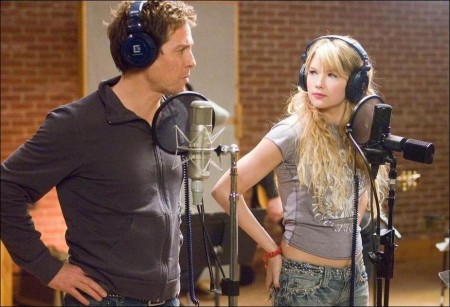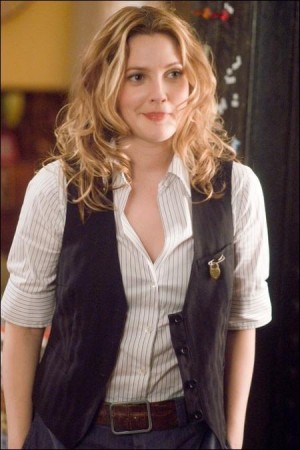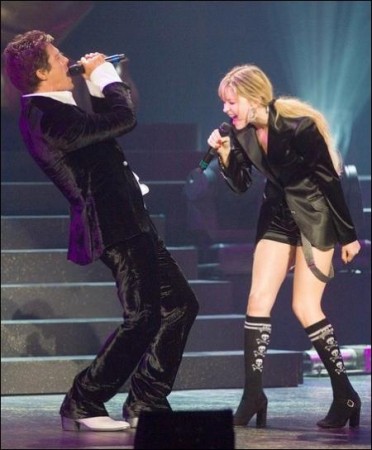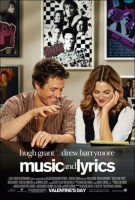“Music and Lyrics” follows Alex Fletcher (Hugh Grant), a washed-up 80s pop star who’s been reduced to working the nostalgia circuit at county fairs and amusement parks. The charismatic and talented musician gets a chance at a comeback when reigning diva Cora Corman invites him to write and record a duet with her, but there’s a problem – Alex hasn’t written a song in years, he’s never written lyrics, and he has to come up with a hit in a matter of days.
Enter Sophie Fisher (Drew Barrymore), Alex’s beguilingly quirky plant lady, whose flair for words strikes a chord with the struggling songwriter. On the rebound from a bad relationship, Sophie is reluctant to collaborate with anyone, especially commitment-phobe Alex. As their chemistry heats up at the piano and under it, Alex and Sophie will have to face their fears – and the music – if they want to find the love and success they both deserve.
For filmmaker Marc Lawrence, writing and directing “Music & Lyrics” was a way to explore a world he’s always been interested in—the world of writing music. “Even though I’ve been in a band, I’m a really bad musician,” he laments, “but I’ve always been fascinated by songwriting. I liked the idea of doing a film about a writer, but if I were to write about a screenwriter, it would get too close to my own personal agony,” he jokes. “So this was a way to write about the creative process, which I’m very familiar with, and also to write about my other great love: music.”
To create the fledgling writing team of Fletcher & Fisher, Lawrence researched legendary duos like the Gershwins and Elton John and Bernie Taupin. “I read a lot of books and watched a lot of documentaries,” he says. “In many of the more famous teams, one person writes lyrics and the other writes music. I knew the conflict of a team, where each person had a specific role in a creative process that is ultimately collaborative, could yield some good comedy.”
To add to the humor, Lawrence’s music writers would have to be an unusual fit. “Alex was part of a Wham-like band known as ‘PoP,’ and his partner went on to great solo success; however Alex’s career went absolutely the other way. Now, his only reliable gigs are state fairs and small local amusement parks, but even those are starting to look like long shots.”
Luckily for Alex, fortune smiles on him when the music industry’s current “It Girl,” Cora Corman, decides she wants him to write her next song. “Alex gets the opportunity to write a duet for this Britney Spears-like artist,” states Lawrence. “At first, all she has is an idea for the title, which she calls ‘Way Back Into Love.’ Now she wants someone to write the song, and sing it live onstage with her at Madison Square Garden, when her album comes out in a few days. Cora seeks out Alex to write the song because his music inspired her when she was a little girl. She thinks he’s retro, which is fine with Alex, as long as he gets a job out of it.”
Although, as a member of PoP, Alex produced several hits in the ‘80s, he has never written lyrics. He also faces a tight turnaround time to write the song, and knows that he is going to be competing against other artists for the one available spot on Cora’s album. Alex has only days to come up with a hit and reclaim his career.
Enter Sophie Fisher, a former writing student who has never attempted to write lyrics and, due to a bad break up with her writing professor, believes she’ll never write anything again. “As it turns out however, she has a natural ability to write lyrics,” reveals Lawrence.
Sophie and Alex only meet by chance when the directionless Sophie comes to Alex’s apartment to water his plants, a job she’s doing temporarily to help a friend. “Alex wasn’t unhappy with his life when he meets Sophie,” says Lawrence. “He’s had to downsize and he’s no longer a big star but he’s comfortable and he thinks he’s figured out who he is. But then he opens his door one day and this exotic bird flies in and flaps around and flies out and he has this very strong reaction. He says, ‘What was that?’ Meeting Sophie gradually begins to change his life.”
The director continues, “Sophie is similar in that she doesn’t want to rock the boat. She had her heart broken by her former professor and boyfriend, Sloan Cates, who betrayed her by writing a thinly veiled fictional account of their relationship, which is now a bestselling book. It’s a very unflattering portrayal that calls Sophie an ‘imitation of a writer who had no real talent or ability.’ Naturally this crushes Sophie, and she finds it impossible to write again.”
“When Sophie meets Alex, they’re both sort of running on a treadmill and not moving forward at all. Both have lost the belief that they can create something beautiful and meaningful,” notes Drew Barrymore who plays Sophie in the film. “So here are these two lost souls who come together to write a song, and they do open each other up again to the fact that they have something to offer the world, to themselves and, ultimately, to each other.”
Hugh Grant, who stars as Alex Fletcher, also enjoyed playing a character who has fallen on tough times. “Alex was a world famous pop star and is now doing school reunion concerts. He handles his undignified position with great good humor, but in a sense with too much good humor. He’s convinced himself that this is all he’s really worth in life. He’s scared of trying to be too creative again. He needs to be reminded that he’s talented and passionate about his music. This is what Sophie does. She reawakens him both creatively and romantically. And he does the same for her in the end.”
But before they realize they can make great music together Alex tries to work with another lyricist and the collaboration fails miserably. Sophie, who happens to be tending to Alex’s plants at the time, suggests a lyric or two, and Alex seizes on it, asking her to come up with more phrases. Sophie is reluctant but Alex realizes that he must drag the song out of her or put the final nail in the coffin of his career. Suddenly, these two people who don’t know each other at all are thrust into a situation where they have to work together, intensely, for entire days at a time.
“These are two artists with very different styles, and suddenly they’re locked in a room together. Their individual quirks begin to emerge and they really get to know each other the way you can with somebody in an intense period,” notes the director. “They’re constantly writing and arguing and walking and eating, and writing and re-writing and trying to force out the song. And for anybody who’s ever had that experience with someone—trying to accomplish something creative— or even traveling for a long period of time, you know you can get on each other’s nerves… and develop a very intimate relationship.”
Cast and Characters
As he began writing “Music and Lyrics,” Lawrence had only one actor in mind for the role of Alex Fletcher, Hugh Grant, with whom he had previously worked on the romantic comedy “Two Weeks’ Notice.” Having great respect for the actor’s talent made it an easy choice. “He’s the best comedic actor I can think of,” Lawrence comments. “He’s great with a lot of words, and I write way too many words in my scripts. Thankfully, Hugh doesn’t object. Also, he could play both the rock star side of this part and the guy who’s very verbal, articulate and intelligent.”
Grant was immediately taken with the script. “I read a lot of romantic comedies and there are very few that make me laugh out loud on the page. This one did. I think Marc Lawrence is truly funny as a writer, though I have never liked him as a man,” he says with his tongue firmly placed in cheek.
When it came time to cast the woman who would become Alex’s perfect partner in both business and romance, Lawrence approached Drew Barrymore. “Drew was the person I most wanted to send the script to. She’s spontaneous and really, really funny,” states Lawrence. “And she also has vulnerability as an actress. There’s nothing she can’t do. When Drew smiles she takes the whole theater with her. There’s no amount of teaching or coaching or pleading that can achieve that effect.”
Barrymore says she was drawn to the project for a multitude of reasons. “There’s a style to this movie that’s refreshing. I think Marc’s writing is of another era; his style of banter reminds me of comedies from the forties and fifties where the man and woman really inspire each other and rally. It’s like watching a tennis match.”
The actress also enjoyed the unique qualities of the characters she found in the script. “There’s something about them that’s true to people in real life. Marc’s characters are very balanced and very specific with lots of idiosyncrasies. Sophie and Alex both have very different ways of dealing with life.”
Lawrence found that the different lifestyles of his two stars added to their on-screen chemistry. “They’re very, very different people,” he confides about Barrymore and Grant. “If you go to their trailers, for example, it would be clear. Hugh’s trailer is very neat; it’s incredibly clean. And Drew’s trailer is usually packed with 30 or 40 people, with clothes all over and dogs lying around. But they really enjoyed those differences and I found that it worked for their chemistry in the film because there’s an odd couple aspect to it that is romantic, sexy and fun.”
While Grant and Barrymore had never worked together prior to beginning “Music and Lyrics,” they both admired the other’s craft. “Hugh is a tremendous comedian and he’s incredibly charming,” says Barrymore. “His acting has an old-fashioned, beautiful quality.”
“Drew brings a charm to any role. She’s so clever and, apart from being a brilliant actress, she’s also a very good bloke. She has a calming effect on set,” notes Grant. “Plus she makes her leading men look good, which is another reason I was so keen to work with her.”
Lawrence sums it up. “I think we’ve got a really terrific pairing in Hugh and Drew.” The character who inadvertently brings Alex and Sophie together is young singing sensation Cora Corman, played by newcomer Haley Bennett. “We auditioned a lot of girls on both coasts for this role. We had a very specific idea of what we were looking for. Haley looked perfect and she could really sing, which was essential for the part,” states Lawrence. “She also got the comedy slant on Cora, which is a little out there and slightly spacey but also sweet.”
Bennett was ecstatic when she got the news that she’d be playing a multi-platinum recording artist. “I moved to California to be an actress and a singer and this part let me do both at the same time,” notes the enthusiastic young actress. “Cora’s very spiritual but also very sensual. She’s also a little insane; she does outrageous things. I did model her after some big pop stars, but she also has an original side. I love that she really cares about her music and its message…even if she is a little over-the-top about it.”
Observing her famous co-stars on set gave Bennett a valuable lesson in acting. “Watching Hugh and Drew work is amazing,” she says. “They’re both so natural and relaxed and I was so nervous. They taught me that you have to be confident and feel comfortable when you are acting, because that’s what people will see.”
The opportunity for Alex to write a song for today’s biggest chart-topper is music to the ears of his loyal and optimistic manager and friend, Chris, played by TV veteran and three-time Emmy winner Brad Garrett. “Chris has been Alex’s manager for years. They were together during the height of his fame, when girls were throwing their panties at Alex on stage, and he also hung in there for the leaner times. I guess the only difference is that the panties have gotten less skimpy as the fans got older. He doesn’t see many bikinis anymore. Either way, they’re both trying to jumpstart Alex’s career,” Garrett remarks.
Lawrence was thrilled to have Garrett on set. “Brad was really open to stuff that I threw in at the last minute,” says the writer / director. “I really appreciated that. He was a great addition to the film.”
Starring as Sophie’s sister, Rhonda, a die-hard PoP super-fan, is actress Kristen Johnston. Manager of the family weight-loss business, “Weight-Not,” Rhonda is a touchstone and confidante to her sister, who has trouble being objective when it comes to her teenage heartthrob.
“My character was obsessed with Alex in high school. She had his Tiger Beat pictures everywhere,” comments Johnston. “So when Sophie comes to her and reveals that she’s working with him, Rhonda freaks out and forces Sophie to drag her wherever Alex is. When Rhonda first sees Alex at the high school reunion concert he’s playing, the memory of this great crush she had on him overtakes her. She bum rushes the stage and kind of terrifies Alex. She regresses to a really immature high school fan, which was tons of fun to play.”
The actress also enjoyed the more obvious contrasts of portraying Drew Barrymore’s sibling. “It’s kind of hard to imagine us as sisters physically because she comes up to my waist. But the relationship worked because the characters have a really strong sisterly bond. Rhonda is protective of Sophie and they share a sense of humor. We had a blast,” declares the actress. “I went into every scene with the objective of making Drew crack up.”
And it worked, as Barrymore attests, “Kristen was always throwing something new into the scene. I pretty much ruined her takes because I’d burst out laughing during them.”
“Kristen is a force of nature,” declares Lawrence. “You can’t teach anyone those kinds of comedy instincts.”
Rounding out the cast is Campbell Scott as Sloan, the contemptible literature professor who breaks Sophie’s heart. “Sloan is a real jerk,” notes the actor, who goes on to qualify, “but a charming one. Both my character and Hugh Grant’s character are writers—not exactly prize fighters—but we get into a physical scuffle when I insult Sophie. The fight is pretty hilarious…and it’s over just as fast as it started. Later Hugh’s character laments that he got beat up by a National Book Award winner. I guess he didn’t realize my character was a martial artist, too,” he jokes.
Music
For Marc Lawrence, the most challenging part of making “Music and Lyrics” would also be the most exciting. “I wrote the script, cast it and did all the things a director would normally do on a film,” he says, “but the one element that was somewhat out of my control was the music. We listened to a lot of songs to try and find the right pieces,” he states. “I wanted the songs to be melodic and memorable, but the lyrics had to be very specific: they had to be in the voice of the characters, and they had to help tell the story. That’s a hard bill to fill.”
The first step toward crafting Alex Fletcher’s sound would be deciding on a genre for him to work in. Lawrence found the perfect match in the ‘80s. “Honestly, it was the best time period for Alex to have made his name. The style of the music suits the character. It presented such a clear picture of who this guy was because, on a certain level, he’s very superficial, which is also the way many people regard ‘80s music—like it was all about production and a catchy melody. And as much mocking as the genre gets, the songs really stick with you,” remarks the director. “It’s like Sophie says in the film to Alex, ‘You shouldn’t be embarrassed of these songs. They’re good, quality work and you should be proud of singing them.
“I love ‘80s music; it’s undeniably delicious,” enthuses Barrymore. “Whenever I go out dancing now, I’m always saying, ‘Can you please play some ‘80s songs?!’ I know I would have been really into PoP.”
Johnston echoes her co-star’s sentiment. “That’s my era…Tears for Fears, The Police. Rhonda and I are very similar in terms of how she felt about Alex in high school. I was really into Stewart Copeland, the drummer for The Police. And Duran Duran, I was hot for them, too.”
To craft some of PoP’s signature songs and Alex’s musical voice, Lawrence hired Adam Schlesinger, one of the songwriters for Fountains of Wayne, the director’s favorite band. Schlesinger, who wrote the catchy title song for the Tom Hanks film “That Thing You Do,” wrote “Don’t Write Me Off,” “Meaningless Kiss,” and “Way Back Into Love,” the last of which represents the product of Alex and Sophie’s first collaboration.
“Adam is brilliant,” says Lawrence. “He managed to do in a few lines for ‘Way Back Into Love,’ what it took me 120 pages to say. He completely captured the romantic theme of the film.”
“Marc is a huge music fan,” says Schlesinger. “Just the fact that he wrote the movie tells you that he’s somebody who really knows and loves music. All the details are correct; everything down to the kinds of instruments that are on the set and the kind of songs that he gravitated towards.”
Schlesinger knew that writing “Way Back Into Love” would be especially tricky. “Marc gave me an early copy of the script and explained that there was going to be one song that was a duet written by Alex and Sophie for Cora,” he states. “That’s a tough assignment for a songwriter, because the song is effectively written by two characters for a third character, and the lyrics have to be universal enough to work in all the different scenes without stepping on the script itself.
“Marc also said that he didn’t want it to be sappy because the love story isn’t between Alex and Cora, yet they have to sing it together at the end,” Schlesinger details. “He told me the movie was shooting in a few weeks and he didn’t have the song yet, and without a song there’s no movie.
No pressure, right?” the songwriter laughs. “I was having the same kind of panic that Alex had.” Writers Andrew Wyatt and Josh Deutsch wrote “Pop Goes My Heart,” PoP’s signature number one hit. “It’s a terrific song,” says Lawrence, “very faithful to the era and very true.” A music video for the song—showcasing Flock of Seagulls’ hair, checkerboard backdrops, dancers in tight nurses’ uniforms and a stereotypical ‘80s light-up heart—was filmed and is featured at the beginning of the film.
Grant personally enjoyed Alex’s ‘80s flashback. “The video was a lot of fun. There are all these shots of the band playing in various costumes, and we acted out these ridiculous stories in a cheesy way. We watched loads of Duran Duran to prepare. I had to wear an enormous amount of rouge. I look a bit like a Parisian madam,” Grant smiles.
Possibly the most serendipitous moment of Lawrence’s search for music came when his own 12-year-old son, Clyde, approached his father with a song he thought might work in the film.
“Clyde wrote ‘Dance With Me Tonight’ because he felt PoP needed a ballad,” says the director with pride. “‘I loved the song, but I’m obviously biased, so I thought I should play it for other people without telling them who wrote it. I didn’t want them to like it just because it was written by my son…and they loved it,” he beams. “Besides, Clyde works cheap. A couple of tickets to the Mets game and his deal was paid up.”
Singing and Dancing
“When I first spoke to Hugh about ‘Music & Lyrics,’ he told me he certainly didn’t play any musical instruments, definitely didn’t sing and couldn’t dance,” confides the director. “It was then that I knew I had to write a musical role for him and force him to do every single one of those things. He went through agony not to mention tremendous hatred of me for putting him in this position,” Lawrence laughs. “And then he went through lots of singing lessons, piano lessons and dance lessons. I have to say, he really applied himself. Hugh’s work ethic is unbelievable.”
“When I took the part of Alex I couldn’t sing or play. I’d taken a year of piano when I was nine years old with Andrew Lloyd Webber’s mother as my instructor, but I gave it up,” laments Grant. “But they hired the very best people to knock me into shape musically for the film and I actually started enjoying it. I didn’t realize how soothing playing the piano could be. I’d get back from a long day’s work and I’d play and sing deep into the night. I came to frankly adore the sound of my own voice though no one else did.”
Michael Rafter, who served as voice and piano coach for the film, helped train the cast to sing. “Hugh and I began with voice,” says Rafter. “And then about a week or two into it I started teaching him basic piano. He’d faked playing on other films, but on this movie he really learned to play the instrument. In fact, he plays the entire song ‘Don’t Write Me Off’ on stage in front of thousands of extras in the film.”
“He was obsessed,” states Rafter. “He’d stay up for hours to practice and come in the next day and say ‘Okay, show me the next two bars.’”
Coaching Barrymore was a bit easier for Rafter because, unlike Grant and Bennett’s characters, Sophie doesn’t have to sing live in front of thousands of extras. “Drew does sing in one scene of the film. She was a bit nervous at first,” admits the voice coach, “but she opened up and surprised herself. She’s a joy.”
Choreographer Dan Karaty’s biggest challenge was to turn Hugh Grant into someone who moves like an ‘80s pop star. “We looked at footage of groups like Duran Duran and Wham and then discussed what we liked and disliked,” notes Karaty. “We found some funny hip movements—Tom Jones style. I told Hugh that the most important thing was for him to go out there and do his own thing. He really played it for the adoring 40-something fans. The scenes are hysterical.”
While the film marked Haley Bennett’s first time acting and singing professionally she trained in both disciplines. Dancing like an internationally recognized mega-star was another matter.
“Teaching Haley to be a stadium concert performer who does full-on dance routines with backup dancers behind her was fun,” says Karaty. “There are two big production numbers in the film. One is called ‘Buddha’s Delight,’ which features 15 dancers and Haley. It’s got pyro blowing up and the 16-foot Buddha turning around for Cora’s reveal. Style-wise, it’s a mix between yoga and sexy hip hop. Haley really rose to the occasion. I believed she was a genuine pop star.”
Location: New York
Lawrence, Grant, Barrymore and company filmed “Music & Lyrics” in Manhattan. “I think it’s a sign of the best kind of writing when all the locations are within a few blocks of your apartment,” teases Lawrence. “At the beginning of pre-production I drew an eight-block radius around my apartment on the upper west side and said ‘all the locations will be here.’”
“I do my own scouting,” adds the director, putting kidding aside. “I think you are a better filmmaker when you have firsthand knowledge of the world you’re in.
“Alex pretty much lives in my apartment,” he goes on to note. “The exteriors are my building. The lobby is my building. His apartment is modeled after the style in my building. I even named the doorman Khan, which happens to be the name of my doorman.”
When the script required Lawrence to move outside of his comfortable “eight-block radius,” he continued to shoot in familiar locations on nearby Long Island. The production ventured to the town of Farmingdale to film a scene where Alex sings at Adventureland, a small local theme park where, not coincidentally, Lawrence worked as a teenager.
Nassau Coliseum in Uniondale, New York, doubled as Madison Square Garden for Cora’s concert, where Fletcher & Fisher’s “Way Back Into Love” makes its public debut.
The cast and crew enjoyed working in the Big Apple. “New York is the type of city that really brings people together,” says Barrymore. “If you look at an apartment building from the outside, there can be hundreds of windows and there are complete worlds going on in those windows. I love that about New York.”
Costume designer Susan Lyall adds, “New York informs everything about a production. There’s a beat to this city and everything you encounter here.”
Designing the ’80s
“People joke about the ‘80s,” comments Lawrence, “but I think a lot of people also have a perverse affection for it.”
While the vast majority of the film takes place in present-day, many of the details of Alex Fletcher’s life would be found in the now infamous “Decade of Decadence.” “The movie lives in two different time periods because Alex hasn’t entirely moved on,” says the writer/director. “The production design needed to reflect that.”
“It was difficult taking an ‘80s rocker who once lived like a huge rock star and turning him into a guy who’s basically ready to lose the lease on his apartment,” notes production designer Jane Musky.
Musky and her talented graphics team designed a catalog of ‘80s memorabilia for the film. “We created an entire campaign for PoP with posters, records and CDs. We did a photo shoot with the band in their ‘80s outfits and then another shoot with Hugh where he was photo-shopped into all different sorts of situations,” explains the designer. “We visually created his entire career over a two-day photo shoot with many costume, prop and makeup changes. With these photos, we made memorabilia; posters, magazine covers and articles, giving PoP a graphic history.”
The production also made keepsakes of places Alex had been all over the world, including a picture of him hopping the Berlin Wall and hanging with the band in Egypt. These insights into his past can be seen in the film, planted all over Alex’s apartment. Lawrence tapped Susan Lyall to create the costumes, citing her experience as “a bit of a rocker herself” to give her inside knowledge of Alex’s world.
“I just dove into the ‘80s research,” states Lyall. “The fashion is all about shoulder pads; they have to be a good foot on each side. It’s also informed by the hair and high-waisted pants, things that seem strange to us now even though it wasn’t that long ago.”
Much of Lyall’s source material came from ‘80s pop band Duran Duran, particularly band front man, Simon Le Bon. “For Alex, I wasn’t trying to make a caricature of some fallen pop star,” she explains, “I was going for the handsome, once-upon-a-time pop star who is looking for another moment to come back and maybe reach a new, younger audience at the same time. Even in the present day, Alex still carries little touches of his ‘80s look, like a scarf wrapped around his neck in a certain way, or by wearing lots of rings. He also wears a little necklace and dark glasses. And he kind of has a fetish for sneakers like other former rock stars.”
By contrast, Lyall had to do a fast-forward for the costumes of her contemporary pop star. “Cora is still a teenager so she always had to be very youthful looking and very ‘of the moment,’” notes Lyall. “Her songs and everything about Cora are overtly sexual, so whatever she’s wearing had to be just a little off-putting… unless of course, you’re a teenager who desperately wants to be up on stage.”
For the climactic “Way Back Into Love” duet, Lawrence wanted his pop star to look classy, and also to be a strong complement to Grant’s Alex. To accomplish the look Lyall designed a costume transition that actually takes place on-stage. “Haley is wearing one costume for a number and then she takes off her little silver mesh hoodie and puts on a satin tuxedo jacket that gives her a kind of modern Judy Garland look. She’s wearing hot pants and the suspenders are hanging down and she has knee socks with pirates on them. For the song, she’s right beside Hugh in his black velvet suit and they look great together.”
Lawrence believes that the song “Way Back Into Love” taps into the film’s theme in the most concise way. “A pair of lines reads ‘I’m looking for inspiration, not just another negotiation,’” he notes. “I think that life, to some extent, is a constant struggle between those two things. We’re all looking for inspiration and those moments of transcendence where your fairy tales or fantasies come true.”
He continues, “The reality is that most of life is closer to a negotiation…especially the dayto-day, mundane aspects of how we live. Deep down, we know you can’t have the inspiration all of the time, and we hope not to have to negotiate so much either, so somewhere in the battle between those two is magic. Alex and Sophie find that magic and I think we all deserve more of that in our lives.”
Production notes provided by Warner Bros. Pictures
Music and Lyrics
Starring: Hugh Grant, Drew Barrymore, Brad Garrett, Kristen Johnston, Haley Bennett, Aasif Mandvi, Campbell Scott
Directed by: Marc Lawrence
Screenplay by: Marc Lawrence
Release Date: February 14, 2007
MPAA Rating: PG-13 for sexual content.
Studio: Warner Bros. Pictures
Box Office Totals
Domestic: $50,572,589 (34.7%)
Foreign: $95,323,833 (65.3%)
Total: $145,896,422 (Worldwide)
